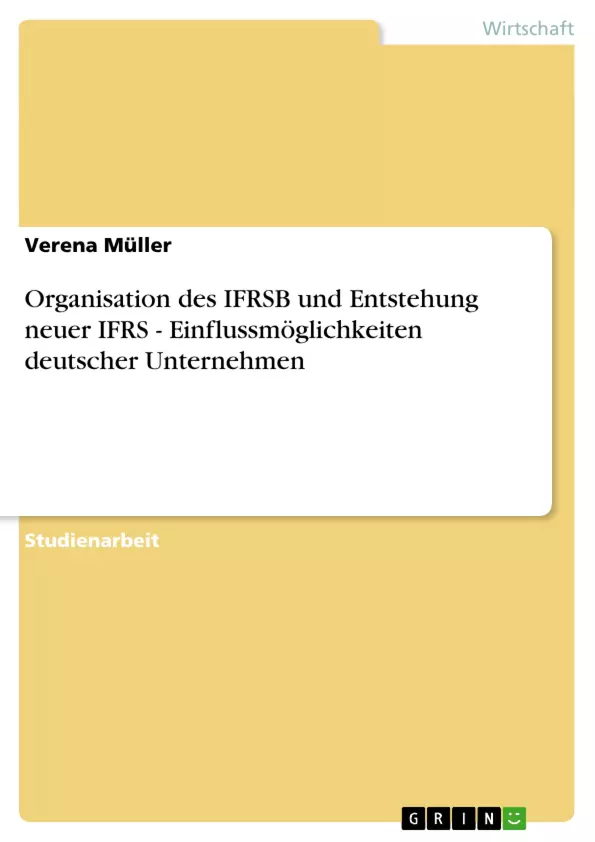Die Bedeutung internationaler Rechnungslegungsstandards für deutsche Unternehmen hat sich in den letzten Jahren grundlegend geändert: Während noch vor wenigen Jahren lediglich international agierende Konzerne von der Rechnungslegung nach internationalen Standards betroffen waren, spielt diese inzwischen auch bei sog. Mittelständlern eine immer bedeutendere Rolle. Begründet wird diese Entwicklung unter anderem durch die Globalisierung der Kapitalmärkte. Da Rechnungslegungsdaten eine wesentliche Informationsquelle für Anlageentscheidungen der Kapitalgeber sind, ist die Forderung nach weltweit verständlichen Rechnungslegungsgrundsätzen gut nachvollziehbar. Ein weiterer Grund, der Rechnungslegung nach internationalen Standards zu einem zentralen Thema bei Unternehmen macht, ist die EU-Verordnung von 2002, nach der ab 2005 bzw. spätestens 2007 alle kapitalmarktorientierten europäischen Unternehmen zur Erstellung des Jahresabschluss nach IFRS verpflichtet sind. Nachfolgend wird die Organisation des International Financial Reporting Standards Board (IFRSB) und der Weg zur Entstehung neuer Standards dargestellt. Zusätzlich wird aufgezeigt, welche Einflussmöglichkeit deutsche Unternehmen auf die Arbeit der Organisation haben.
Inhaltsverzeichnis
- Bedeutung internationaler Rechnungslegungsstandards für deutsche Unternehmen
- Das International Financial Reporting Standards Board
- Entstehung und Zielsetzung
- Organe des IFRSB
- International Accounting Standards Committee Foundation
- International Accounting Standards Board
- Liaison Members
- International Financial Reporting Interpretations Committee
- Standards Advisory Council
- Chief Executive/Technical Director/Commercial Director
- Formales Standardsetzungsverfahren - Due Process
- Vorbereitende Schritte
- Projektvorschlag und Aufnahme in Arbeitsprogramm
- Informationssammlung und weitere Vorarbeiten
- Draft Statement of Principles
- International Financial Reporting Standard
- Auswertung und Beratung
- Exposure Draft
- Auswertung und Beratung
- Public Hearings und Field Tests
- Einflussmöglichkeiten deutscher Unternehmen
- Fazit
Zielsetzung und Themenschwerpunkte
Die Arbeit befasst sich mit der Organisation des International Financial Reporting Standards Board (IFRSB) und der Entstehung neuer IFRS. Im Fokus steht insbesondere die Frage, welche Einflussmöglichkeiten deutsche Unternehmen auf die Arbeit des IFRSB haben.
- Die Entstehung und Entwicklung des IFRSB
- Die Struktur und Organisation des IFRSB
- Das formale Standardsetzungsverfahren - Due Process
- Die Rolle deutscher Unternehmen im Standardsetzungsprozess
- Die Bedeutung internationaler Rechnungslegungsstandards für deutsche Unternehmen
Zusammenfassung der Kapitel
Das erste Kapitel behandelt die Bedeutung internationaler Rechnungslegungsstandards für deutsche Unternehmen. Es wird die Entwicklung der internationalen Rechnungslegung und die wachsende Bedeutung der IFRS für Unternehmen in Deutschland dargestellt. Das zweite Kapitel befasst sich mit der Organisation des International Financial Reporting Standards Board (IFRSB). Hier werden die Entstehung des IFRSB, die Ziele der Organisation sowie die einzelnen Organe und deren Aufgaben erläutert. Kapitel drei beschreibt das formale Standardsetzungsverfahren - Due Process. Es werden die verschiedenen Phasen des Verfahrens sowie die Rolle der Stakeholder im Standardsetzungsprozess dargestellt. Abschließend wird im vierten Kapitel die Frage aufgeworfen, welche Einflussmöglichkeiten deutsche Unternehmen auf die Arbeit des IFRSB haben.
Schlüsselwörter
IFRSB, Internationale Rechnungslegungsstandards, Due Process, Standardsetzung, deutsche Unternehmen, Einfluss, Globalisierung, Kapitalmärkte, EU-Verordnung, International Accounting Standards Committee (IASC), International Accounting Standards Board (IASB).
Häufig gestellte Fragen
Was ist das IFRSB?
Das International Financial Reporting Standards Board ist eine unabhängige Organisation, die weltweit anerkannte Rechnungslegungsstandards (IFRS) entwickelt.
Was bedeutet 'Due Process' bei den IFRS?
Das formale Standardsetzungsverfahren, das Transparenz und die Einbeziehung der Öffentlichkeit (z.B. durch Exposure Drafts) sicherstellt.
Wie können deutsche Unternehmen Einfluss auf IFRS nehmen?
Durch Stellungnahmen zu Entwürfen (Exposure Drafts), Teilnahme an Public Hearings, Field Tests oder Mitarbeit in Beratungsgremien.
Warum müssen deutsche Firmen IFRS anwenden?
Aufgrund einer EU-Verordnung sind kapitalmarktorientierte Unternehmen verpflichtet, ihre Konzernabschlüsse nach internationalen Standards zu erstellen.
Was ist das Ziel weltweit einheitlicher Rechnungslegung?
Die globale Vergleichbarkeit von Unternehmensdaten für Investoren und die Erleichterung des Zugangs zu internationalen Kapitalmärkten.
- Quote paper
- Verena Müller (Author), 2005, Organisation des IFRSB und Entstehung neuer IFRS - Einflussmöglichkeiten deutscher Unternehmen, Munich, GRIN Verlag, https://www.grin.com/document/43260



